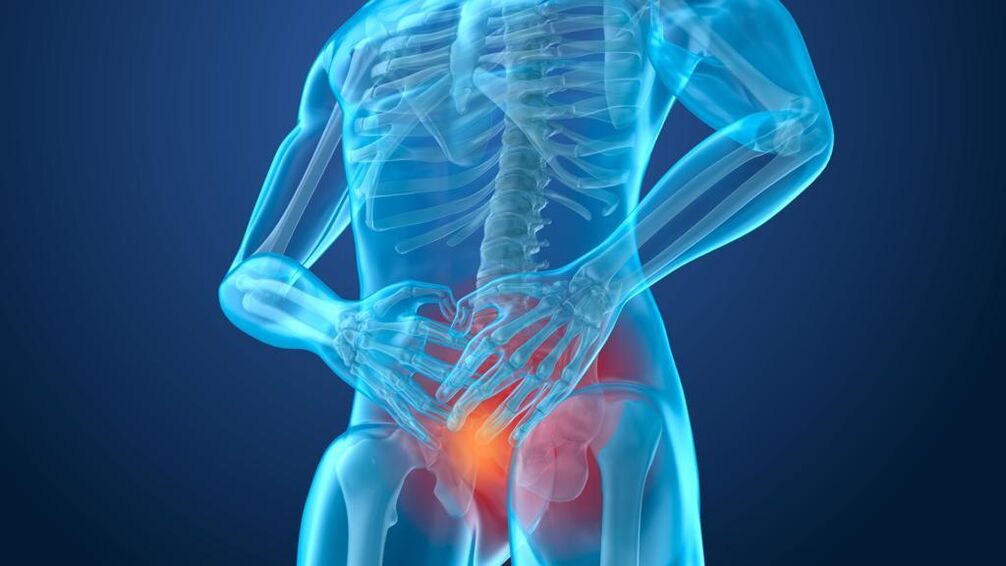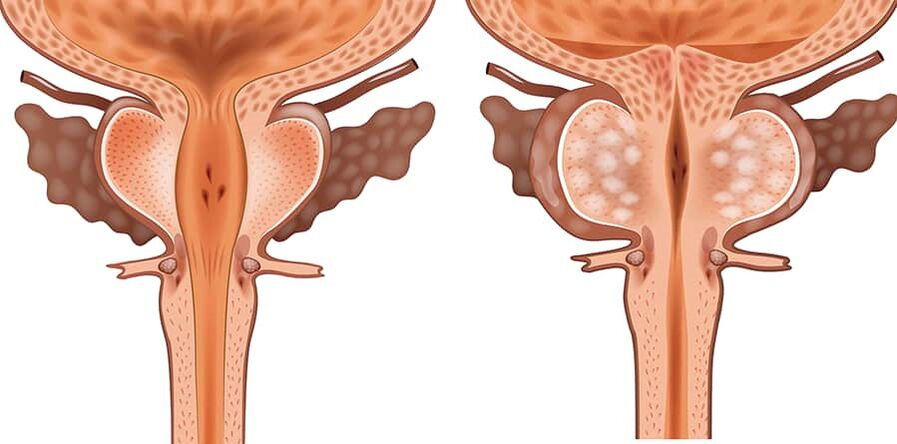Prostatitis is a disease that according to statistics, 1 in 10 men have it. The disease is diagnosed mainly in the age of 30-50 years.

Many men are embarrassed to talk about the symptoms of prostatitis with their doctor, which leads to chronic disease, complicated treatment, and complications with fertility problems. It is important to start treatment at an early stage of the pathological process.
Moreover, about which drugs to treat prostatitis in men are commonly prescribed and considered the most effective.
What is prostatic disease
Prostatitis is a disease characterized by an inflammatory process in the prostate gland (sperm gland). The gland performs several important functions, one of which is the production of a specific secretion that protects and nourishes the sperm. Fluid contains enzymes, proteins, fats, hormones, without which the reproductive system cannot function properly.

Another important function of the prostate is to liquefy sperm, making it more mobile and able to reach its target.
If an inflammatory process begins in the prostate gland, its work is interrupted. In this case, the man feels characteristic symptoms.
Causes and symptoms of prostatitis
The main source of the development of prostatitis is the penetration of infection and stagnation in the tissues of the testicles. Bacteria and germs enter the prostate from:
- genital;
- foci of chronic infection from a distance by blood stream (dental caries, sinusitis, sinusitis, influenza, pneumonia, tonsillitis, boils);
- nearby inflamed organs (inflamed rectum), v. v.
Predisposing factors for the development of the disease:
- abstaining from intercourse for a long time;
- wearing clothes that are too tight;
- alcoholism, smoking, drug addiction;
- frequent interruptions of intercourse;
- defective ejaculation;
- irregular sex life;
- heart rhythm disturbances;
- frequent constipation;
- a condition that suppresses the immune system (stress, unhealthy diet, lack of sleep);
- single or permanent hypothermia;
- the presence of chronic infections (bronchitis, tonsillitis, cholecystitis);
- strong sexual arousal, then intercourse does not follow;
- deferred urinary diseases (cystitis, urethritis);
- transfer of genital infections (gonorrhea, trichomoniasis).
Hyperplasia, or prostate tumor, with a benign course, can also provoke the development of the disease. In addition, perineal trauma is a predisposing factor to the onset of prostatitis. These are commonly seen in motorcyclists, motorcyclists, cyclists, etc. v.

It should be noted that bacterial prostatitis is diagnosed 8 times less often than not infectious. The main reason for the latter is stagnation in the gland. This leads to poor blood circulation through small vessels, swelling of prostate tissue, and increased oxidation of lipid free radicals. All these processes facilitate inflammation and intense pain in the perineum and genitals.
During a flare-up of prostatitis in men, there are:
- increased urination;
- urine may come out with impurities of blood, pus; mental disorders - irritability, lack of sleep, anxiety;
- violation of the process of urination - can be difficult, painful;
- pain in the scrotum, rectum, and penis;
- erectile dysfunction.
With an exacerbation, body temperature may rise slightly.
Pharmacological group of drugs for the treatment of prostatitis
There are the following pharmacological groups for the treatment of prostatitis:
- Antibacterial drugs for prostatitis (Ciprofloxacin, Azithromycin). They are prescribed to eliminate pathogenic microflora. With the help of the active ingredients that make up the drug, the pathogens that cause the infectious process are destroyed. Antibiotics are taken during the acute phase and during the period of remission.
- An alpha blocker (Tamsulosin). Doctors prescribe this class of drugs as needed to improve urodynamics, facilitate urine outflow in patients, and reduce the likelihood of consequences of hyperplasia.
- Antispasmodics (Drotaverine hydrochloride, Papaverine, Metamizole sodium). Such drugs for the treatment of prostatitis are prescribed for pain relief to relax the smooth muscles of the prostate gland, improving blood circulation.
- Non-steroidal anti-inflammatory drugs with analgesic effect (Tolperisone hydrochloride, Nimesulide, Meloxicam, Diclofenac). Such prostatitis medications are prescribed to relieve pain, cramping, increased muscle tone of the perineum, urination problems, and inflammation.
- Pain relievers (Metamizole sodium, Diclofenac). Pain relief. Prescription in the form of tablets, rectal suppositories, injections.
- Plant products. The medicine contains only natural herbal ingredients. Prescription in combination with drugs. Designed to relieve pain, reduce inflammation, reduce mental stress. They are prescribed both in chronic and acute form (in combination with other drugs).
- Hormonal drugs for prostatitis (Cyproterone acetate, Flutamide). Eliminates the inflammatory process, reduces swelling of the glands, normalizes the process of urination.
Essential medicine for prostatitis and brown planthopper rầy
Next, we will describe in more detail the drugs most often prescribed by doctors for prostatitis, which are most effective in the fight against this disease.
Tamsulosin hydrochloride
Tamsulosin hydrochloride is a medication indicated for the treatment of benign hyperplasia (adenoma) of the prostate gland. It belongs to the group of alpha blockers. Available in capsule form. The main active ingredient of the drug is tamsulosin hydrochloride. This component helps to reduce the tone of the smooth muscles of the prostate gland.
Drugs not used:
- childhood;
- severe liver failure;
- with orthostatic hypotension (reduced standing pressure).
Uncontrolled oral medications and non-compliance with contraindications can lead to the following undesirable effects:
- dizziness;
- rhinitis;
- rash on the skin, accompanied by itching and redness;
- asthenic syndrome;
- sharp drop in blood pressure;
- strong heart rate.
The frequency of application of the drug is 1 time per day. Capsules are washed with plenty of water. Reception should be done in the morning before meals.
When taking the drug, especially in the first days, people who work with complex mechanisms and drive cars should be careful.
Pumpkin Oil
Prepare herbs. It is prescribed to treat prostatitis and to prevent it.
The main active ingredient restores the functions of the prostate gland due to its anti-inflammatory effect and improves microcirculation. In addition, the substances that make up pumpkin seed oil counteract the production of the hormone dihydrotestosterone, which is responsible for prostate growth, improve kidney and liver function, and cleanse the intestines and intestines. toxic.
The drug should be taken 3 times a day, 1 tablet each time after meals. The capsules are washed down with plenty of water. The course of treatment is 1 month.
Side effects after taking the drug are very rare. Basically, the reaction is observed from the gastrointestinal tract - nausea, abdominal pain, heartburn. Long-term use of the drug can cause stool disorders.
Contraindications include ulceration of the gastrointestinal mucosa in the acute phase, biliary stones.
Prepared with ingredients: pumpkin seed powder; golden tree extract; aspen leaf extract; pumpkin globulin
The drug is used to treat chronic prostatitis, prostatic hyperplasia accompanied by painful urination.
The drug is produced in the form of tablets, which are well tolerated by patients, since it has a herbal composition. Only occasionally can we note allergic reactions to the constituent drugs.
The drug is taken 3 times a day, 2-4 tablets each time. The duration of treatment is 12 weeks.
Prepared with ingredients: pumpkin seed powder, selenium; zinc; citrus pectin; nettle extract, lycopene obtained from tomatoes; African palm fruit extract; African plum peel extract
The drug is a biologically active functional food for men with prostate diseases. Available in pill form.
It is necessary to take the drug at the same time once a day during meals with water. The admission period is 30 days. Prostatitis medicine is well tolerated by men and does not cause side effects. In some isolated cases, patients have had an allergic reaction to the components of the drug.
Herbal preparation with ingredients: feel chondodendron, canadian poplar, serrata
An herbal preparation prescribed for diseases of the prostate gland and genitourinary system in men. The tool eliminates pain, reduces inflammation, eliminates spasms.
The main indications for the use of the drug are:
- benign prostatic hyperplasia;
- inflammatory diseases of the genitourinary system;
- chronic and acute urinary retention;
- enuresis, pyelonephritis;
- kidney pain;
- urolithiasis.
Medicines for prostatitis are produced in the form of drops. You need to instill 5-15 drops at a time. The frequency of use of the drug is 3 times a day. The duration of treatment depends on the pathological process, but should be at least 6 weeks. The drug should be taken half an hour after or before a meal, slowly dissolving in the mouth.
Contraindications include individuals with intolerance to the components of the drug and children under 12 years of age. As for the adverse reactions, they appear rarely and only in the form of allergies.
How to choose medicine?
The choice of drug for the treatment of prostatitis is necessary depending on the form of the disease. With an exacerbation, antibiotics are prescribed first. The sooner you start taking antibacterial medication, the quicker the symptoms go away and the less likely it is to have complications and turn the disease into a chronic stage.
If the disease is accompanied by pains in the genital system, mental disorders in the form of irritability, anxiety, insomnia, sexual dysfunction. In this case, you should take drugs that improve blood circulation, eliminate pain, inflammation and mental problems. For these purposes, the following are specified:
- analgesic;
- antispasmodics;
- NSAIDs;
- antibacterial drugs (with frequent exacerbations);
- immunomodulatory drugs;
- herbal sedative.
In all cases, only a doctor can prescribe medicine for prostatitis after an examination. Self-treatment can lead to many serious consequences, one of which is infertility.




































